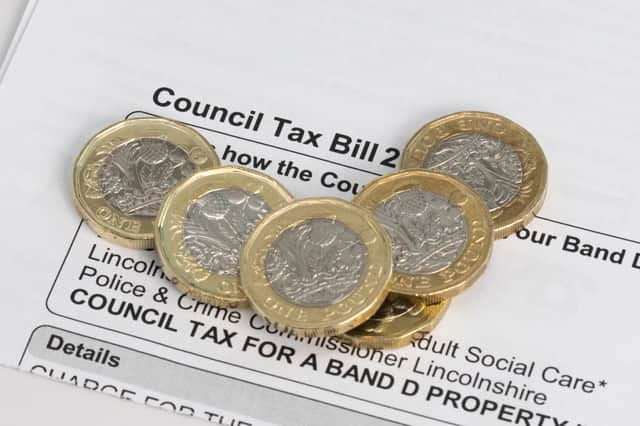Huge council tax rises confirmed from April - how to check costs in your area


Households across the UK will face huge hikes to their council tax bill from April, as the cost of living crisis continues.
Local authorities were given the green light last year to increase the levy by up to 5%.
Advertisement
Hide AdAdvertisement
Hide AdChancellor Rishi Sunak announced in the latest budget that councils could hike rates by up to 3% without having to hold a referendum and on top, can add an additional 2% which is ring fenced for adult social care.
Some councils may add more to the adult social care portions, as it can be carried over from last year.
Any new council tax rates always take effect from the start of April, to coincide with the new tax year.
Councils across the UK are now starting to confirm how much residents will see their bills increase by in just over a month, with these new rates to remain in place until March 2023.
Advertisement
Hide AdAdvertisement
Hide AdSurrey County Council and Lincolnshire County Council have approved separate 4.99% rises, while people living in Lancashire, Buckinghamshire and Southend will see rises of 3.99%.
Households in Worcestershire will see bills go up by 3.94%, and a 2.99% hike has been proposed in West Sussex, Kent, Suffolk, Liverpool, Stoke on Trent, Leeds, Derby, Luton and Islington.
East Sussex County Council has agreed a 1.99% council tax increase.
As each council is in charge of setting their own rates, residents will need to check the website of their local authority to see if they have proposed a council tax rise yet.
How do I check how much my council tax is going up?
Advertisement
Hide AdAdvertisement
Hide AdThe amount of tax you will pay is determined by your local council and will depend on what band your home falls under.
Every property is placed into a council tax band, which is based on the value your home would have been worth in April 1991.
The more expensive a property is, the higher the amount of council tax you will be charged.
Advertisement
Hide AdAdvertisement
Hide AdBand A – up to £40,000Band B – £40,000 to £52,000Band C – £52,000 to £68,000Band D – £68,000 to £88,000Band E – £88,000 to £120,000Band F – £120,000 to £160,000Band G – £160,000 to £320,000Band H – property value over £320,000
In Wales, there are nine bands which are categorised as follows:
Band A – under £44,000Band B – £44,001 to £65,000Band C – £65,001 to £91,000Band D – £91,001 to £123,000Band E – £123,001 to £162,000Band F – £162,001 to £223,000Band G – £223,001 to £324,000Band H – £324,001 to £424,000Band I – property value over £424,001
In Northern Ireland, there is no system of council tax bands as domestic rates are based on rental prices instead. More information on how properties are valued can be found on the government website.
Advertisement
Hide AdAdvertisement
Hide AdIf you live in England and Wales you can check your council tax band by entering your postcode on the government website, while those living in Scotland can use the Scottish Assessors website.
Can I get help with paying my bill?
The UK government has confirmed a new £150 council tax rebate scheme which will apply to bills from April.
It will affect homes in council bands A, B, C and D in England, which is around 20 million households, including 95% of rented properties.
In Scotland, residents in bands A to D will also be entitled to £150 off, but can also qualify if they are currently getting a council tax reduction as well.
Advertisement
Hide AdAdvertisement
Hide AdHouseholds not covered by the rebate may be able to get a discount if you claim certain benefits, are on a low income, are single, or have caring responsibilities.
Discounts range from 25% to 100%, but the amount will depend on where you live.
- Whether you are entitled to help through a Council Tax Support scheme will depend on:- Where you live- Your circumstances - for example your income, number of children, benefits, residency status- Your household income - this includes savings, pensions and your partner’s income- If your children live with you- If other adults live with you
You can contact your local council to find out if you are eligible and apply for a council tax reduction directly.